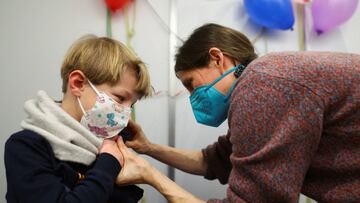Coronavirus US: is the vaccine effective for kids, how many doses are necessary?
Many parents are considering getting their children vaccinated as the more contagious Omicron variant takes hold in the US. But are the vaccines effective?


Currently, the Pfizer and BioNTech vaccine is approved for use in children as young as five. While children do not typically experience severe cases of covid-19, they can spread the virus to more vulnerable populations. Additionally for parents who hope that their child’s school can remain open depends on schools not becoming super spreader sites as more contagious variants take hold.
Around a fifth or 5.6 million children between the ages of five and eleven in the United States have received at least one dose of a covid-19 vaccine. However, the American Academy of Pediatrics has reported wide variation in the rates across states ranging from six to fifty-one percent.
Which states have the highest rate of children (5-11) with one dose?
- Vermont (51 percent)
- Massachusetts (41 percent)
- Maine (36 percent)
- Rhode Island (36 percent)
- Connecticut (36 percent)
Which states have the lowest rates?
Which states have the highest rate of children (5-11) with one dose?
- Louisiana (6 percent)
- Mississippi (6 percent)
- Alabama (7 percent)
- Tennessee (10 percent)
- Wyoming (10 percent)
Source: American Academy of Pediatrics
The rate is higher for older children, with around 52 percent or 12.9 million teenagers having received both doses of the vaccine.
Parents of younger children will need to wait longer to get their children vaccinated. Pfizer recently said that their vaccine for children younger than five did not provide a strong immune response.
JUST IN: Pfizer-BioNTech said two doses of its COVID vaccine did not produce a robust immune response in kids ages 2 to 5 — and will expand its ongoing clinical trials to include a third dose for kids and infants.https://t.co/qo0Y2jjGNS
— NPR (@NPR) December 17, 2021
How effective are vaccines in children?
How vaccines protect children against the Omicron variant is unknown. However, most public health experts still believe that they are our best bet at protecting people. The US Centers for Disease Control and Prevention (CDC) has updated their guidance about Omicron saying “COVID-19 vaccines are highly effective at preventing severe illness, hospitalizations, and death. Scientists are currently investigating Omicron, including how protected fully vaccinated people will be against infection, hospitalization, and death.”
What are the possible side effects of the vaccines in children?
Related stories
The side effects experienced by some children are similar to those felt by adults including fatigue, muscle pain, chills, nausea, fever, and pain or redness at the injection site. The CDC recommends that parents ask their child’s doctors if they can give their child a non-aspirin pain reliever if they do experience side effects. A warm damp cloth could also be applied around the injection site to reduce swelling and discomfort.
Which children are eligible to receive a booster shot?
Only teenagers sixteen and older are eligible for a booster shot. Sixteen and seventeen-year-olds became eligible in early December with CDC Director Rochelle P. Walensky, M.D., M.P.H.saying: “We know that COVID-19 vaccines are safe and effective, and I strongly encourage adolescents ages 16 and 17 to get their booster if they are at least 6 months post their initial Pfizer vaccination series.”
